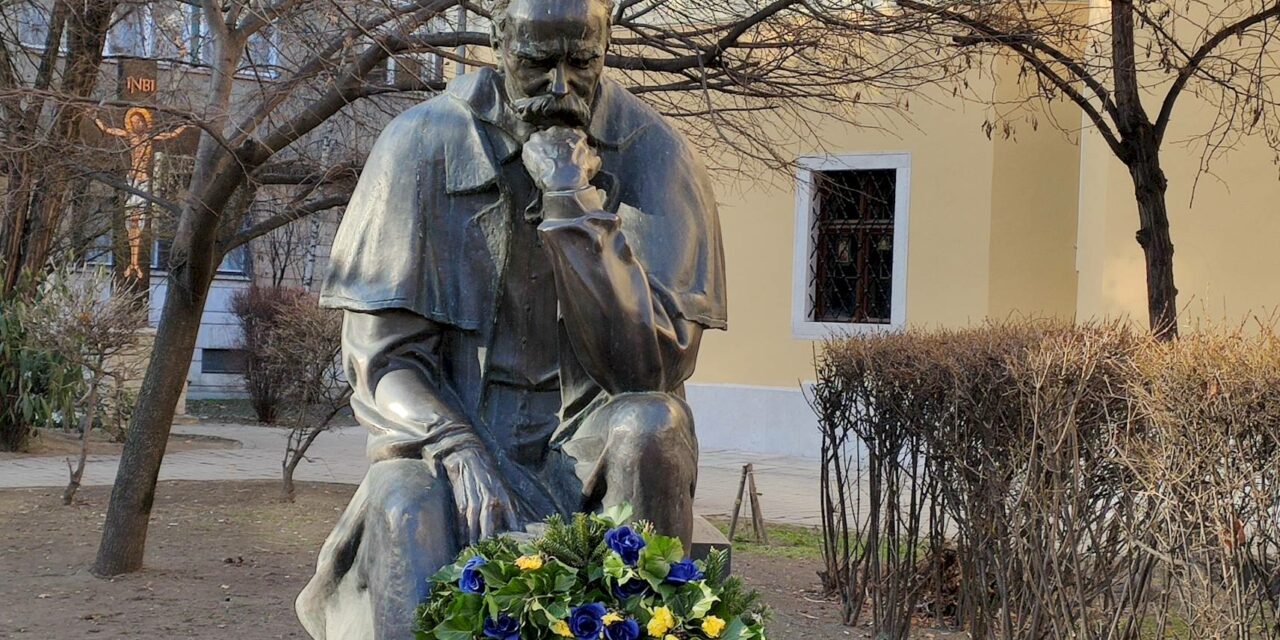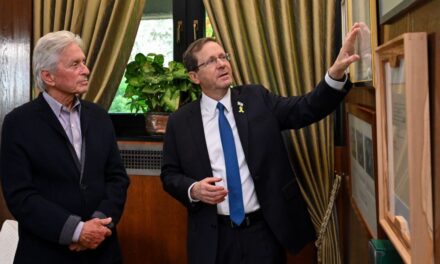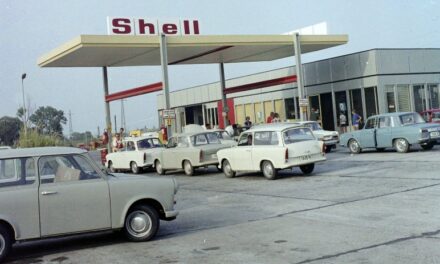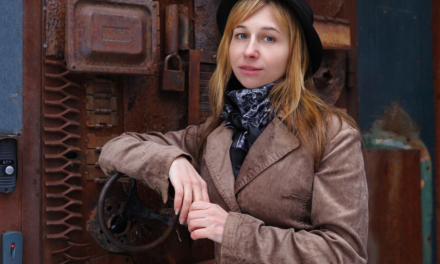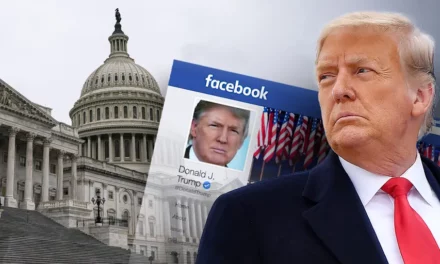The statue of the Ukrainian poet Taras Shevchenko (1814–1861) is located in the Water City, behind the King's Bath, in the middle of the square named after him. The statue was erected as a symbol of good neighborly relations and friendship between Ukrainians and Hungarians in 2007, and was inaugurated by László Sólyom and Viktor Yushchenko, the two state presidents at the time.
Shevchenko was born in the territory of the Kyiv Governorate in Russia, since at that time Ukraine as a state did not yet exist. From a freed serf, he became an incendiary poet in accordance with the spirit of the age, a spiritual leader of the Ukrainian intelligentsia, a symbol of the Ukrainian nation's desire for freedom and democracy.
The statue is sometimes wreathed, flowers are placed on its pedestal, perhaps the other day Ambassador Ljubor Nepop did it as well, and no one has ever mutilated it, repainted it, or hurt it. With his chin resting on his left hand, the poet is perhaps pondering what he is doing here, in this shady little park in Buda?
I keep a Shevchenko volume at home, a gift from the Ukrainian Ministry of Culture, perhaps from 1996. I received it at an international conference in Izmail, where the topic was Ukraine's international commitment and the provision of education in minority languages. My Western European colleagues were delighted with what they saw, they did not understand my shaking of the head and disbelief. The language of the conference was English, and when a heated dispute arose between the local officials - that is, the Russian-Ukrainian conflict - the interpreter stopped translating. Home Affairs, we were told. Anyway, we couldn't tell whether they spoke Russian or Ukrainian, but they understood each other well anyway. It was a strange, divided world, everywhere in the cities there were monuments to Soviet heroes, statues of Lenin. On the promenade in Odessa, Ukrainian and Russian veterans of the Second World War walked proudly, the orders of merit earned in the ropes of the Red Army jingling on their worn shirts. Everything here seemed very Soviet to me.
It is difficult to find a real Ukrainian in the world. The development of Ukrainian literature was hindered by the absence of an independent Ukrainian state, and the unraveling of Ukrainian history simply by the absence of Ukraine. It can be identified as a territorial designation from the 13th century onwards, in the original meaning of the word, "border region". From time to time, the status of the border region was understood to mean different areas, and it was not at all stably linked to a specific geographical area. Ukrainians were those who lived in the periphery at the time. The Ukrainian folk name is not very old, because until the 19th century this people belonging to the large family of Eastern Slavs was called "Kisoros".
A Ukrainian is someone who claims to be Ukrainian, I could say after Sándor Csoóri freely. Ukrainian, for example, the president of Ukraine, Vladimir/Volodymyr Zelenskiy, was born into a Russian-speaking Jewish family (according to Wikipedia). Perhaps that is why he does not have any conscience issues about making the Ukrainian people homeless, the destruction of Ukraine and the attempts to annihilate people of other identities. Although the president considers himself - as his party says - "servant of the people".
"Je suis Ukraine". As a result of the war, many people all over the world suddenly became friends of Ukraine, in the framework of the symbolic blue sky and endless rolling wheat fields, many people show solidarity with the people fighting for their freedom. Without knowing anything about Ukraine, its language, its history, its culture. About the Ukrainian people or Russian-Ukrainian coexistence, about the Eastern Slavs. I would like to know what kind of representative result the multiple-choice test filled out on the subject would bring either east or west of Elba. Do they know the location of Ukraine, its neighbors, the composition of the population, even Shevchenko's name and what his being Ukrainian had to do with the Russian Tsar? Do you know how independent independent Ukraine was created in 1991, how the border that never existed was drawn?
The Nobel Prize-winning Russian writer Alexander Solzhenitsyn returned to Russia after thirty years of American exile. He did not regret the disintegration of the Soviet Union, but he regretted the fact that, without reason or consideration, the borders of the Soviet member republics, arbitrarily drawn by Lenin, were used as national borders. Eighteen percent of the Russian population, twenty-five million Russians, moved outside Russia's new borders. Like a Russian volunteer at Trian, I could say, since the newly independent states certainly treat the Russians outside the border badly. Not only Ukrainians.
In 1994, Solzhenitsyn also said about Ukraine that a way must be found to make all nominally Ukrainians speak Ukrainian instead of Russian. In the meantime, the language should also be developed in order to make up for its lagging behind in the fields of science, technology and culture, because according to the writer, the Ukrainian language has not yet reached the expected level of development.
"The Russians want to destroy Ukraine's self-identity, they claim that Ukrainians have no language, no culture, nothing." This is what Olena Striltsiv, a Ukrainian cultural scientist who fled from Lviv to Munich, says to the camera. Olena immediately got a job at the Bavarian State Library. He became an employee of the worldwide project called SUCHO (Saving Ukraine Culture Heritage Online), employing 1,300 people, which was created to save the endangered Ukrainian cultural heritage. In fact, Ukrainian online interfaces are being archived to save Ukraine's cultural wealth and tourist attractions from Russian hacker attacks. Colleagues save a lot of things, for example true stories about Ukrainian soldiers. Or the pictures that show the thousand-year past of the Ukrainian capital, Kiev, contrasted with Moscow, which was still covered by a dense forest a thousand years ago. "From here you can also see how false the Russian claim is that they were here before and that they also founded us. This is simply not true," says the Ukrainian scientist.
(At this point I was also uncertain. I cannot decide whether Anastasia, the daughter of the Grand Duke of Kiev, for whom our King Andrew I was even willing to convert to Orthodox Christianity in 1038, was now Russian or Ukrainian?)
While the world is saving Ukrainian cultural heritage, Ukraine is removing Russian classics from its libraries, everyone from Lermontov to Tolstoy to Chekhov, removing statues of Russian celebrities from public squares, and changing Russian-sounding street names. The cancel culture has also reached Eastern Europe. The world assists him, bans Russian athletes from competitions, blocks Russian news portals, we will never know the true stories about Russian soldiers. Europe supports Ukraine in its righteous role of victim, while the aggressor punishes the Russians with self-defeating sanctions. A typical Belarusian "woke", riddled with globalist Russophobia and ignorance.
Ukrainian poet Tarasz Shevchenko can reflect on the past and future in the Buda park named after him. For example, why the Eastern Slavic peoples are not able to solve their national, economic and cultural problems together, in an alliance. As suggested by his fellow Russian writer Solzhenitsyn.
Source: Magyar Hírlap/Irén Rab
Featured image: Wikimapia

